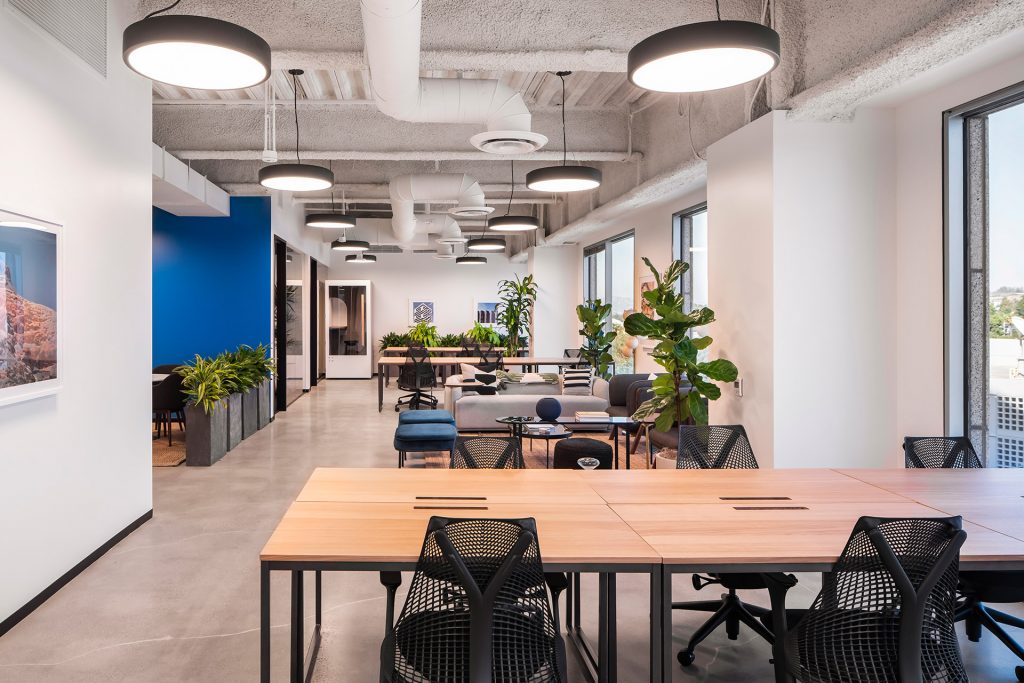When the world of work faced total disruption and the old rule book went out the window, companies turned to flexible workspace models to give employees greater choice in how and where they work, improving work-life balance for many.
However, flexible space solves for so much more than simply a company’s space needs. The right flexible space provider can help a company foster collaboration and engagement, as well as furthering company culture.
Lisa Cations, Industrious’ Senior Director of Sales, says enterprise companies are in the flex arena to stay, and that long term, enterprise clients will be the fastest-growing segment of the industry.
“Flex is a sort of testing ground for [enterprise clients] to adopt newer work styles, and a way for them to have the space they need in the moment without losing the ability to scale their space as their needs change.”

Not sure if flex space would work for your business? Here are a few benefits to consider.
1. Savings on real estate costs
A physical headquarters can serve as a symbol of a company’s brand and values, as well as a place for in-person collaboration and team building. With a hybrid work model, where employees are on-site only a few days a week, companies can retain the benefits of having a headquarters while reducing their real estate costs by downsizing their portfolios and using flexible workspaces for their satellite offices.
2. Mitigating uncertainty
According to CBRE, the average employee will spend 24% less time in the office and 87% of large companies intend to adopt a hybrid work approach.
This shift has prompted companies to consider flexible spaces, which allow businesses to stay nimble in the face of a constantly evolving and still-to-be-determined future. Flexible spaces make it easier to adapt both a company’s real estate portfolio and how employees approach their work if circumstances change—such as if a new variant emerges and prompts a lockdown.
It also enables companies to grow or contract their businesses and establish a presence in any location —whether to tap regional talent or test out new markets— without being locked into a long-term lease.
3. Creating operational efficiencies
Thanks to in-house services provided by flex space providers, companies can save time and money on setting up and managing their own properties, thereby creating operational efficiencies. With ready-to-use spaces equipped with the digital infrastructure required to run a business, and amenities such as events programming, food and beverage, cleaning services, and community teams, companies don’t have to handle the day to day of facilities management and can focus on their core business.
4. A variety of spaces
Whereas traditional office settings revolve around individual workstations, a flex space provider can offer a variety of settings for different activities. Assigned desks, shared workspaces, and focus rooms could be best for heads-down work where distractions should be minimized, whereas closed-door conference rooms, meeting rooms, and huddle spaces could be suitable for collaboration and team building.
Meanwhile, cafés and open lounges with comfortable seating are likely to encourage the spontaneous, informal social interactions that spark ideas and build camaraderie.
Employees work differently in different settings, and over the course of the day, their work needs change. This range of space options allows them to choose the environment that works best for them in whatever function they’re performing.
5. A greater emphasis on employee preferences and choice
Not only do flex space work models help businesses remain adaptable to unexpected circumstances, but they can also help them better accommodate employee preferences.
In the US Workplace Survey Winter 2021, the Gensler Research Institute reports that around 52 percent of U.S. workers would prefer working some of the time at home and some of the time at the office, which a flex space model supports.
Furthermore, a recent survey from Mercer showed that flexibility was one of the top benefits that employees were looking for in the workplace; and employers who addressed this priority would stand at an advantage when attracting and retaining talent.
What’s more, with Covid-19 still a top concern among employees, and the unpredictable nature of each new variant, a hybrid work model with flex space can minimize the spread of infection by giving employees the option to allocate work days from home or at the office depending on the latest situation.
This approach makes employees feel at ease and in control about their safety and lets them know that their company is investing in their well-being. Meanwhile, companies can maintain a hub for collaboration and socialization for when employees are ready to return to the office.